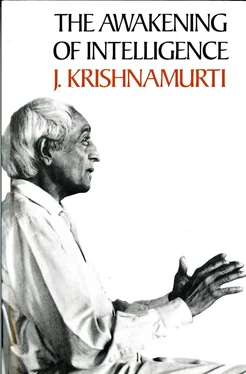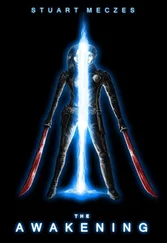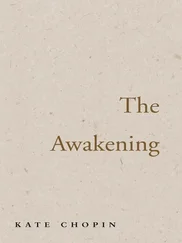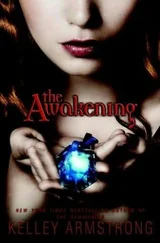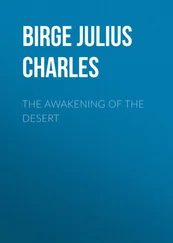KRISHNAMURTI: I didn’t say love is God.
Questioner: I read one of your books . . .
KRISHNAMURTI: I’m sorry, don’t read books! ( Laughter ) That word has been used so much, is so loaded by man’s despairs and hopes. You have your God, the Communists have their gods. So find out, if I may suggest, what love is. You can only find out what love is, by knowing what it is not. Not knowing intellectually, but actually in life putting aside what it is not—jealousy, ambition and greed, all the division that goes on in life, the me and the you, we and they, the black and the white. Unfortunately you won’t do it because it needs energy, and energy comes only when you observe actually what is and don’t run away from it. When you see actually what is, then in the observing of it, you have the energy to go beyond it. You cannot go beyond it if you are trying to escape from it, to translate it, or to overcome it. Just observe actually what is, then you have abundance of energy, then you can find out what love is. Love is not pleasure, and to really find that out, inwardly, for yourself, do you know what that means? It means that there is no fear, that there is no attachment, no dependency, but a relationship in which there is no division.
Questioner: Could you talk about the role of the artist in society—does he serve a function beyond his own?
KRISHNAMURTI: Who is an artist? Someone who paints a picture, writes a poem, who wants to express himself through painting or through writing a book or a play? Why do we divide the artist from the rest of us?—or the intellectual from the rest of us? We have placed the intellectual at one level, the artist perhaps at a higher level, and the scientist at a still higher level. And then we say, “What is their role in society?” The question is not, what is their role, but what is your role in society; because you have created this mess. What is your role? Find out, Sir. That is, find out why you live within this world of squalor, hatred and misery; apparently it does not touch you.
Look, you have listened to these talks, shared some of the things together, understood, let’s hope, a great deal. Then you become a centre of right relationship and therefore it is your responsibility to change this terrible, corrupt, destructive society.
Questioner: Sir, could you go into psychological time?
KRISHNAMURTI: Time is old age, time is sorrow, time doesn’t heed. There is chronological time by the watch. That must exist, otherwise you won’t be able to catch your bus, cook a meal, and all the rest of it. But there is another kind of time, which we have accepted. That is, “Tomorrow I will be, tomorrow I will change, tomorrow I will become”; psychologically we have created time—tomorrow. Is there a tomorrow, psychologically? That question fills us with dread to ask seriously. Because we want tomorrow: “I shall have the pleasure of meeting you tomorrow, I am going to understand tomorrow, my life will be different tomorrow, I will realise enlightenment tomorrow.” Therefore tomorrow becomes the most important thing in our life. You have had sex yesterday, all the pleasures, all the agonies—whatever it is—and you want it tomorrow, because you want that same pleasure repeated.
Put that question to yourself and find out the truth of it. “Is there a tomorrow at all?”—except in thought which projects tomorrow. So tomorrow is the invention of thought as time, and if there is no tomorrow psychologically, what happens in life today? Then there is a tremendous revolution, isn’t there? Then your whole action undergoes a radical change, doesn’t it? Then you are completely whole now, not projecting from the past, through the present, into the future.
That means to live, dying every day. Do it, and you will find out what it means to live completely today. Isn’t that what love is? You don’t say, “I will love tomorrow”, do you? You love or you don’t love. Love has no time, only sorrow has time—sorrow being thought, as in pleasure. So one has to find out for oneself what time is, and find out if there is a “no tomorrow”. That is to live, then there is a life which is eternal, because eternity has no time.
NEW YORK CITY
25 APRIL 1971
AMERICA
III
Two Conversations:J. Krishnamurti and Alain Naudé
1The circus of man’s struggle
2On good and evil
1
THE CIRCUS OF MAN’S STRUGGLE
Conversation between J. Krishnamurtiand Alain Naudé
Naudé: 1You speak about the whole of life. When we look about us there is so much disorder everywhere; it seems that people are so confused. In the world we see that there is war, ecological disorder, political and social disorder, crime, and all the evils of industrialisation and over-population. And it seems that the more people try to solve these problems the more they augment. Then there is man himself, who is full of problems. He has not only the problems of the world about him, but is full of problems inwardly—loneliness, despair, jealousy, anger—all this we may call confusion. And presently he dies. Now we have always been told that there is something else, which has variously been called God, eternity, creation. And about this man knows nothing. He has tried to live for this, in relation to this; but it has again made problems. It seems from what you have said so many times that one must find a way of dealing with these three sets of problems, these three aspects of life at the same time, because these are the problems confronting man. Is there a way to ask the question properly so that it will answer these three sets of problems at the same time?
KRISHNAMURTI: First of all, Sir, why do we make this division? Or is there only one movement which must be taken on the wave itself? So first let’s find out why we have divided this whole existence into the world outside of me, the world inside of me, and something beyond me. Does this division exist because of the chaos outwardly and are we only concerned with the outer chaos, and totally neglect the inner chaos? Not finding a solution for the outer, or for the inner, we then try to find a solution in a belief, in the divine?
Naudé: Yes.
KRISHNAMURTI: So in asking a question of this kind, are we dealing with the three things separately, or as a total movement?
Naudé: How can we make them into a unitary movement? How are they related? What is the action in man which will make them the same?
KRISHNAMURTI: I wouldn’t come to that yet. I would ask: why has man divided the world, his whole existence, into these three categories? Why?—and from there move. Now why have I, as a human being, divided the world outside of me from the world inside me, and from the world which I am trying to grasp—of which I know nothing—and to which I give all my despairing hope?
Naudé: Right.
KRISHNAMURTI: Now why do I do this? Tentatively we are asking: is it that we have not been able to solve the outer with its chaos, confusion, destruction, brutality, violence and all the horrors that are going on, and therefore we turn to the inner and hope thereby to solve the outer? And not being able to solve the inner chaos, the inner insufficiency, the inner brutality, violence and all the rest of it, not being able to solve anything there either, then we move away from both, the outer and the inner, to some other dimension?
Naudé: Yes, it is like that. That is what we do.
KRISHNAMURTI: That is what is happening all the time around us and in us.
Naudé: Yes. There are the problems outside which engender the problems inside. Not being able to deal with either, or both, we create the hope of some other, some third state, which we call God.
Читать дальше
